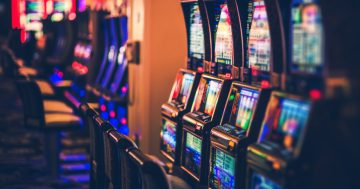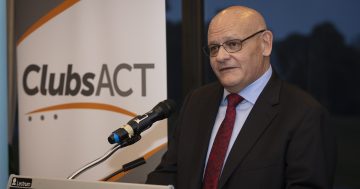
Clubs are essential community facilities but rely heavily on poker machines for their revenue. Photo: File.
COVID-19 has seen Canberra’s 4000 pokies fall silent. While there are many in the community who have been deeply concerned about the impact of poker machine gambling harm, the complete and rapid closure of ACT clubs is not something anyone expected.
This has had a devastating impact on individual workers and businesses who require our support. This situation does, however, mean that there is a need to consider where to next when we reach a position where clubs can safely re-open to ensure that we do all we can to reduce the risk of gambling harm.
In recent weeks, action has been taken by both the Federal Government and the ACT Government to support the 1700 workers who rely on our local clubs. Programs such as the JobKeeper program, tax relief and rental support are well-targeted measures to soften the blow that has been dealt to this industry.
This relief is necessary and appropriate.
But these supports need to be complemented with serious discussion with the local club industry about what comes next, and how we can build a better, more community-focused industry that is not dependent on gambling revenues.
We know that we will get through this crisis. We also know that the world on the other side of this crisis will be very different from the one that we knew only a few weeks ago. It will have more vulnerable households, higher unemployment, and an increase in people dealing with the mental health impacts of a period of physical distancing and social isolation. It will also be the time when the decisions we make will have a lasting impact on our community.
As we come through this crisis, our community support system will be stretched to the limit by increased needs caused by this economic shock and an increase in community disadvantage. The traditional support services will not be in a position to respond to a new raft of need caused by gambling-related harm.
But we also cannot return to the pre-COVID-19 status quo which saw one-in-ten Canberrans suffering gambling harm each year. We cannot return to a business model where 40 per cent of profits are known to come from people experiencing gambling harm.
Instead, we must introduce measures to minimise future harm caused by gambling.
During this time of pause, there is a need for the government to work with the local clubs sector to protect local workers and enable clubs to fulfill their valued roles, including as safe community spaces where people can gather and connect, rather than measures that merely prop up the gambling industry. Part of this must include clear commitments to reduce the reliance on poker machine revenue.
The recently announced ACT Government package of support to the clubs sector included an offer to ACT-based clubs to receive financial compensation if they surrender additional poker machine licences. While this proposal is currently capped at 250 machines, if expanded, this is a realistic pathway for ACT Clubs to rebuild their businesses in a way that divests from a revenue base built on the back of harm caused to individuals, families and communities. This should be explored as a mechanism for local venues to totally divest from operating poker machines.
The ACT Government must look at expanding the program to enable a significant reduction in the number of pokies across Canberra suburbs and a level of financial support for venues to invest in community-focused economic activity.
Given the potential for even more harm to be created in a post-COVID-19 world, once we look at a re-introduction of poker machine gambling in venues, we can no longer delay action to mitigate the risk posed by design features of poker machines that we know cause harm.
We must change the current situation where the ACT has some of the weakest regulation in Australia to protect consumers. Simple measures such as significant reductions in per spin bet limits, load up limits and a ban on losses disguised as wins, as well as a limit on venue EFTPOS/ATMs must all be part of the discussion to provide a level playing field for gambling consumers and protect vulnerable community members.
I want to see community-focused locally based clubs supported as part of the economic and social recovery once the most difficult parts of the COVID-19 health crisis have passed. I think, however, this is an opportunity to support our local clubs to fulfill their core community purpose rather than support gambling activity. What would you like to see your local club do in the community?
Rebecca Vassarotti is an ACT Greens candidate for Kurrajong in the upcoming Territory election. She is a founding member (and previous co-chair) of the Canberra Gambling Reform Alliance. She was a member of the Board of the ACT Gambling and Racing Commission.





















